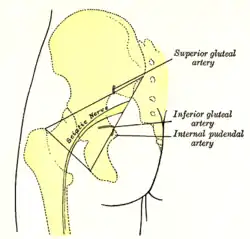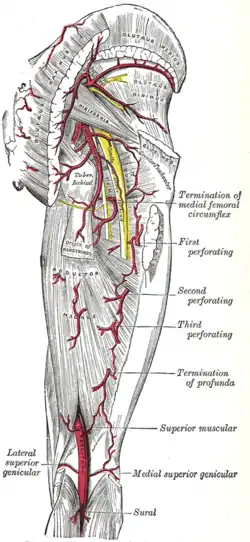Superior gluteal artery
The superior gluteal artery is the largest and final branch of the internal iliac artery. It is the continuation of the posterior division of that vessel. It is a short artery which runs backward between the lumbosacral trunk and the first sacral nerve. It divides into a superficial and a deep branch after passing out of the pelvis above the upper border of the piriformis muscle.
| Superior gluteal artery | |
|---|---|
 Left gluteal region, showing surface markings for arteries and sciatic nerve | |
 Internal iliac artery and some of its branches (superior gluteal artery labeled at right) | |
| Details | |
| Source | Internal iliac artery |
| Vein | Superior gluteal veins |
| Supplies | Gluteus maximus, gluteus medius, gluteus minimus and tensor fasciae latae |
| Identifiers | |
| Latin | Arteria glutaea superior |
| TA98 | A12.2.15.013 |
| TA2 | 4310 |
| FMA | 18868 |
| Anatomical terminology | |
Within the pelvis, it gives off branches to the iliacus, piriformis, and obturator internus muscles. Just previous to exiting the pelvic cavity, it also gives off a nutrient artery which enters the ilium.[1]
Structure
The superior gluteal artery is the largest and final branch of the internal iliac artery.[2][3] It branches from the posterior division of the internal iliac artery.[2] It exits the pelvis through the greater sciatic foramen.[3] It divides into a superficial and a deep branch.[3]
Superficial branch
The superficial branch passes over the piriformis muscle.[3] It enters the deep surface of the gluteus maximus muscle, and divides into numerous branches.[3] Some branches supply the muscle and anastomose with the inferior gluteal artery, while others perforate its tendinous origin, and supply the integument covering the posterior surface of the sacrum, anastomosing with the posterior branches of the lateral sacral arteries.[1]
Deep branch
The deep branch lies under the gluteus medius and almost immediately subdivides into the superior and inferior divisions.
The superior division continues the original course of the vessel, passing along the upper border of the gluteus minimus to the anterior superior spine of the ilium (ASIS), anastomosing with the deep iliac circumflex artery and the ascending branch of the lateral femoral circumflex artery.
The inferior division crosses the gluteus minimus obliquely to the greater trochanter, distributing branches to the gluteal muscles and anastomoses with the lateral femoral circumflex artery.
Some branches pierce the gluteus minimus and supply the hip-joint.[1]
Function
The superior gluteal artery takes part in the trochanteric anastomoses, forming a connection between internal iliac and femoral artery.
Additional images
 Superior gluteal artery and many of the structures it supplies.
Superior gluteal artery and many of the structures it supplies. The arteries of the gluteal and posterior femoral regions.
The arteries of the gluteal and posterior femoral regions.
See also
References
This article incorporates text in the public domain from page 622 of the 20th edition of Gray's Anatomy (1918)
- "Gray, Henry. 1918. Anatomy of the Human Body. Page 622". www.bartleby.com. Retrieved 2018-05-03.
- Elias Soueid, Nassif; Mountcastle, Timothy S.; Levine, Joshua L.; Allen, Robert J.; Chiu, Ernest S.; Vasile, Julie (2009-01-01), Wei, Fu-Chan; Mardini, Samir (eds.), "CHAPTER 36 - Superior and inferior gluteal artery perforator flaps", Flaps and Reconstructive Surgery, Edinburgh: W.B. Saunders, pp. 525–539, ISBN 978-0-7216-0519-7, retrieved 2021-01-13
- Hamdi, Moustapha; Gagnon, Alain R. (2009-01-01), Wei, Fu-Chan; Mardini, Samir (eds.), "CHAPTER 28 - Gluteus flap", Flaps and Reconstructive Surgery, Edinburgh: W.B. Saunders, pp. 377–395, ISBN 978-0-7216-0519-7, retrieved 2021-01-14
External links
- Anatomy photo:43:13-0105 at the SUNY Downstate Medical Center - "The Female Pelvis: Branches of Internal Iliac Artery"